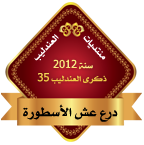When the late Abdel Halim Hafez (1929-77) first sang his patriotic songs in the 1950s and 1960s, he didn’t imagine that they would become a voice of the Egyptian revolution half a century later.
"I swear on its sky and soil/ I swear on its roads and doors/ I swear on the wheat and factory/ I swear on the minaret and the gun/ On my children / On my coming days/ The Arab sun will never set/ As long as I live."
“I Swear” is but one song by Hafez that has regained popularity nowadays and was repeatedly sung and heard around the capital during the recent 18-day that resulted in the ouster for former President Hosni Mubarak.
Halim was one of the most popular singers in Egypt and the Arab world and is considered one of the "Great Four of Arabic Music," along with Om Kalthoum, Mohamed Abdel Wahab and Farid al-Attrash. He was also an actor, conductor and movie producer.
His lifelong friend, colloquial poet Abdel Rahman al-Abnoudi, describes Hafez with his warm voice, dark skin and shiny eyes as the Arab equivalent of Frank Sinatra. He sang many love songs and was often cast in films as the romantic lover. But Hafez was never satisfied with this limited framing and tried to touch upon social issues in his roles.
Hafez starred in 16 films, most of which touched on class divisions through the life of a poor young man who falls in love with an upper class lady. He also costarred in Dalila, Egypt’s first color film, in 1956.
"He used the money he made from singing love songs and acting to fund his patriotic songs," says Abnoudi.
“He believed in every word he sang, which was reflected in his passion. He promoted the values of the 1952 revolution at times of victory and defeat alike. So when we listened to songs like ‘I Swear,’ we believed him,” he adds.
It is this sense of sincerity that brought his songs to the minds of Tahrir protesters.
Halim was a partner at Sawt al-Fan - one of two holding music production companies besides the state-owned Sawt al-Kahira.
"I wrote him many songs in the late ‘60s, especially after the 1967 defeat,” Abnoudi explains. These songs evoked feelings of belonging and patriotism like “Your Son Calls You a Hero,” “Never Mind, Mr. President” and “I Swear.” Neither Hafez nor his composers or writers ever took money during that period for their work, which often caused Hafez problems with his partners at Sawt al-Fan.
"Hafez didn't care what the partners thought. He wanted to sing along with his countrymen for Egypt at this critical time. He swore to sing 'I Swear' at the beginning of every concert until Egypt won back its land," says Abnoudi.
Abnoudi wasn't Hafez’s only poet friend. The young singer adopted a workshop style while working with poets and composers.
"It says something that Hafez was a close friend to most successful Egyptian poets, including Salah Jaheen, Morsy Gameel Aziz and Hasan al-Sayed," says Abnoudi, adding that Hafez’s relationship with his coworkers was a partnership in creative production.
"He knew how to choose his songs and often discussed the songs’ ideas and lyrics with us," he says.
Hafez's dedication can be attributed to his early passion for music. His talents appeared at age 7, and he joined the Arabic Music Institute in Cairo when he was 11.
As a teenager, he became known among his classmates for singing the songs of Abdel Wahab. He then joined the Higher Theatrical Music Institute and graduated as an oboe player.
Hafez was known for his deep passion when singing and his strong and unique voice, which earned him the name "The Dark Nightingale."
He had concerts in almost every Arab country and occasionally sang in Europe. He is best known for putting his heart and soul in all of his songs and was never shy to show his deep emotions while singing.
An icon of modern Arabic music, Hafez was called "King of Romance," "King of Arabic Music," "King of Emotions and Feelings," the "Ambassador of Love," and "Son of the Revolution."

















